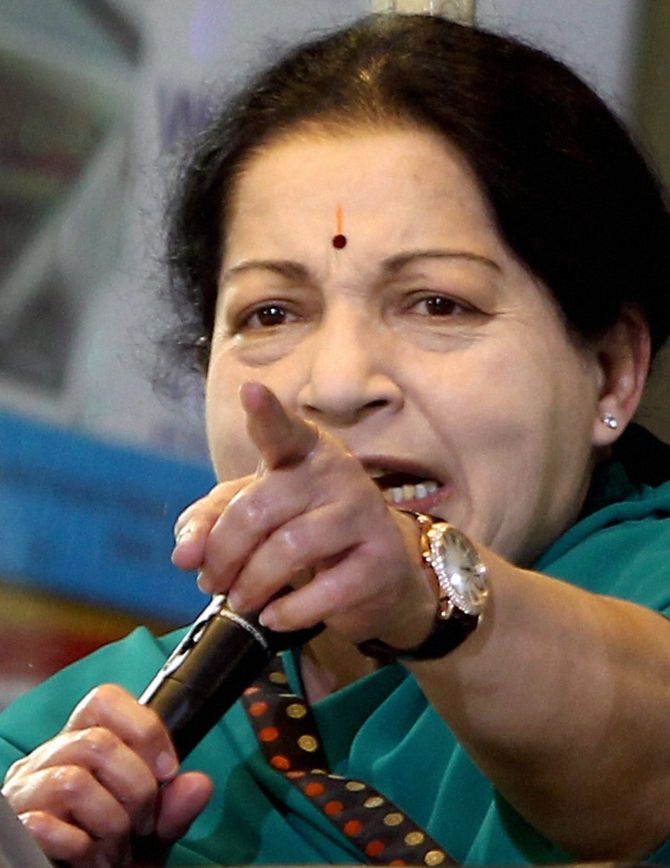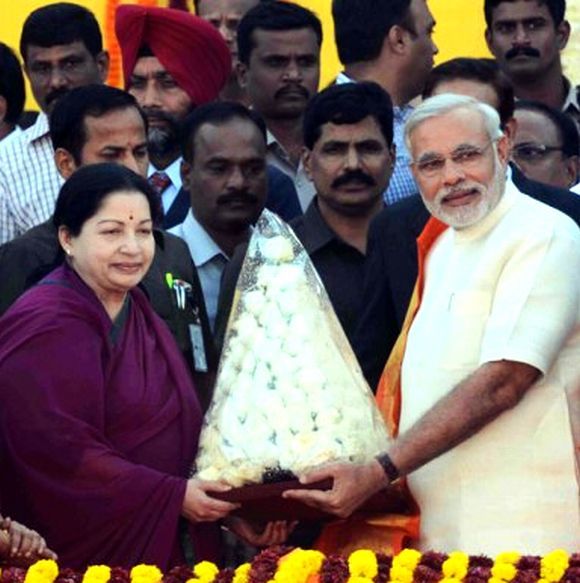'Having learnt her lesson in popular democracy, Jaya would become more populist than the DMK and more so than the imagery that mentor MGR had created in the Tamil voter's mind, both as an individual and as an elected ruler.'
N Sathiya Moorthy assesses J Jayalalithaa, chief minister.
 Iinexperience, inadequate advice and improper assistance meant that J Jayalalithaa would go the same way as M Karunanidhi had done, but on the larger issues of corruption and lawlessness, which had in his time brought MGR to power in the first place.
Iinexperience, inadequate advice and improper assistance meant that J Jayalalithaa would go the same way as M Karunanidhi had done, but on the larger issues of corruption and lawlessness, which had in his time brought MGR to power in the first place.
Jaya herself would lose her Bargur seat in backward Dharmapuri district in the assembly polls of 1996, when senior state Congress veteran G K Moopanar would walk out of the party to join hands with the DMK under immense public and cadre pressure.
That was also when Tamil cinema's by-now-acknowledged superstar Rajnikanth told his fans and audiences alike that if ever Jaya returned to power, 'even god cannot save Tamil Nadu.'
Jaya would bounce back, first in the 1998 parliamentary polls, in the company of the BJP, after the Coimbatore serial blasts targeting senior leader L K Advani.
She would change boats mid-stream by calculatedly breaking ties with the BJP first and wooing Moopanar's Tamil Maanila Congress away from the DMK's side, before returning to power in the assembly elections of 2001, with a House strength that even MGR could not have imagined in his time with much stronger allies.
In between, Jaya would make an enemy of then Janata Party leader and prime minister P V Narasimha Rao's political friend Subramanian Swamy, provoke him into launching the Nallatchchi Iyakkam (Good Governance Movement) against her maiden government -- and make up with him, and also Rajiv Gandhi's widow Sonia Gandhi who would come to lead the Congress party.

In doing so, Jaya would quit Prime Minister Atal Bihari Vajpayee's BJP-led National Democratic Alliance government which she had helped to come to power in 1998 -- and yet would make up with the BJP for the 2004 polls, which her combine would lose to better electoral alliance arithmetic that Karunanidhi had worked out.
Her defeat owed also to her government's 'unpopular', 'anti-people' economic and pricing policies, and her sacking of 100,000 state employees at one go for protesting for higher salaries -- appreciated by the nation's apex court, but not by the voters at home.
It would also mean that Jaya would have to change places with Karunanidhi as chief minister in 2006.
That would also be the last time she would do so.
Having learnt her lesson in popular democracy, Jaya would soon bend over backward to become more populist than the DMK when in office, and more so than the imagery that mentor MGR had created in the Tamil voter's mind, both as an individual and also as an elected ruler.
It is this pace that would make the name 'Amma' sound and feel every bit that of a 'caring mother.'
Elections or no elections, budget or no budget, the Jayalalithaa government would introduce more populist schemes than those from the past, throwing economics to the winds.
Gone were the days from 2001, when Jaya would go hammer and tongs at Karunanidhi for leaving behind empty coffers and spending over 85 per cent of the state's annual budget on establishment expenses, including salaries, bonuses and pensions.
On the eve of the 2016 assembly polls, when the DMK stood a fair chance until almost the counting day, it would be Karunanidhi's turn to complain how Jayalalithaa would leave behind a higher government deficit than what the state could ever handle.
But Jayalalithaa and Tamil Nadu's voters had decided that Karunanidhi and the DMK would not have to manage unmanageable levels of deficit, returning the AIADMK to power.
Yet, she also sought to keep Tamil Nadu's flag flying, questionably at times, as a top industrialised state in the country, with highly educated youth -- and would not mention the highest levels of educated unemployed/unemployable youth on the one hand, and massive internal labour migration from the Hindi-speaking parts of the country, despite all the anti-Hindi Dravidian rhetoric from the pre-power past of the early to mid-sixties.
Despite poor health, arthritis and spondylosis, Jaya would win successive elections with practised ease, and run a government with a firmness of mind that Karunanidhi had never been able to display or MGR too had not tried.
The more problematic her health became, Jaya seemed to become even more determined to rule the party and government with a firmer hand than ever before.
Afflicted reportedly by diabetes and diabetes-induced problems, she would not give up easily on election 2014 first, and even more in election 2016.
Rising like a phoenix from her alleged illness, Jaya would win election 2016, despite the increasing popularity and acknowledged acceptance of the DMK's M K Stalin.
In between, Jaya also won and lost, and lost and won court cases, and attended assembly seats and consequent by-elections.
All of them making a sterner woman of her, and proving to the world outside the lengths that she was willing to go, to make her political and electoral points, sound, clear and loud.
Yet, facts are facts and courts and cases were courts and cases.
For a political leader with her kind of background, Jaya got embroiled with the Centre's income-tax department and the Enforcement Directorate, not owing to her earnings during her successful film career, as often is the case, but from her more popular days as a politician, the state's chief minister at that.
Each such episode took a turn of its own, blemishing her image and that of the party, which she would erase with a successful electoral outing at the next turn.
The Dharmapuri bus-burning case in which three lady students of the Agriculture University, Coimbatore, were burnt alive flowed from irate AIADMK cadres opposed to a trial court in Chennai sentencing Jaya to prison in the Pleasant Stay Hotel illegal construction case from her first term in office, setting the students' bus afire.
Jaya was acquitted in the case, but the party cadres were still facing a review petition in the Supreme Court years later. They did not seem to care -- either repentant for the thoughtless act or at having to be sentenced to death by the trial court and upwards in the judiciary.
Jaya's 2001 return to power was likewise marred by the Supreme Court declaring her disqualified ab initio from contesting the assembly polls, to be able to become chief minister in the first place, after being sentenced to a prison term in the Tansi land deal case.
Though she had contested and won from four different assembly constituencies, as if to send out a strong political message, and then governor Fatima Beevi would swear her in as CM without any loss of time, the Supreme Court would intervene to oust Jaya from power.
The Supreme Court, after taking its time studying the case in some detail for close to a year after the final hearing of the case, acquitted her and all the co-accused, introducing for the first and possibly only time the concept of a 'plea bargain,' which was/is alien to Indian criminal jurisprudence.
The case was closed after Jaya and Sasikala and the company that they jointly owned offered to return the government land that they had purchased during her first term in office, but dragging on until after she had returned to power a second time.

It's all a part of Jaya's never-say-die attitude, it would seem.
Thus, even as she exited the scene, the Supreme Court was to pronounce the verdict in the 'disproportionate assets case,' again dating back to her first term in office, but her legal team had managed to drag on for nearly two decades, even after the apex court had ordered continuous hearing over a decade ago.
If it meant that Jaya would be serving a couple of weeks in a Bangalore prison, so be it.
However, after Trial Judge Michael de Cunha had found her guilty, Justice C Kumaraswamy of the Karnataka high court, to whose jurisdiction the Supreme Court would transfer the pending case from Tamil Nadu after Jaya had returned to power, would upturn the verdict -- leading to the much-awaited Supreme Court verdict.
Whatever might have been in the minds of the two learned Supreme Court judges hearing the disproportionate assets case, an acquittal granted by the high court was still in operation at the time of Jayalalalitaa's death.
For the party cadres and the state, it remains to be seen if the Supreme Court will pronounce a verdict of acquittal against Sasikala and the rest, declaring the case against Jaya infructuous after her death, or deem the entire case as infructuous in the absence of the first accused.
Alternatively, a verdict of guilty and conviction against Sasikala and the two other co-accused could imply the possible extension of the same to Jaya, if she were alive.
Jayalalithaa will remain an enigma after her death just as she was one when she was around.
Not a word was known to her cadres and leaders alike as to what had become of her health, why, how and for how long.
The leaders would swoon over the sorrow of her exit and the cadres would declare their inability to bear the irreparable and irreplaceable loss that is theirs and theirs alone.











 © 2025
© 2025